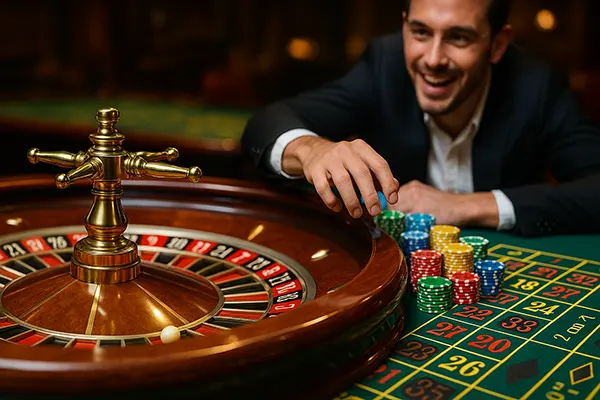Series of Wins: How One Player Beat the Roulette 10 Times in a Row

Winning at roulette ten times in a row may sound impossible, yet one player managed to achieve this extraordinary feat. Their success sparked debates about probability, strategy, and human psychology in games of chance. Understanding how such a streak occurred requires looking at both the mathematical and behavioural aspects behind it.
The Unlikely Streak
The player reportedly focused on even-money bets such as red/black and odd/even, where the chance of winning each spin is about 48.6% in European roulette. By winning ten consecutive rounds, they defied odds of roughly one in a thousand — a rare but possible outcome given the millions of spins played worldwide every day.
Witnesses described the player as remarkably composed throughout the streak. There were no emotional outbursts or erratic betting patterns, which often lead to mistakes. This discipline helped maintain a consistent betting rhythm, avoiding the common psychological traps that cause players to lose focus during winning runs.
Importantly, this streak did not occur on high-risk bets like single numbers, where the odds are just 2.7% per spin. Instead, the player maximised their chance of consecutive wins by using lower-risk bets, showing that risk management can play a role even in a game based purely on chance.
Probability and Mathematical Context
Mathematically, ten consecutive wins on even-money bets result from compounding probability: 0.486 raised to the 10th power equals roughly 0.1%. This makes the event highly unlikely, though not impossible, given enough attempts and time. Many players underestimate how small probabilities can still occur naturally over large numbers of trials.
Statistically, gambling environments create countless spin sequences every day, increasing the chance of rare streaks appearing somewhere. This concept is known as the “law of truly large numbers” — if enough trials are conducted, even extremely unlikely outcomes will eventually occur.
However, it is vital to remember that past results do not influence future spins. Each roulette spin is independent, meaning the probability remains constant no matter how many wins have come before. This is where many gamblers fall into the gambler’s fallacy, believing a loss becomes “due”.
Psychological Factors Behind the Streak
Maintaining emotional control during a long winning streak is challenging. Many players increase their bet sizes out of excitement, which often leads to quick losses. The player who won ten times reportedly kept their bet size consistent, avoiding the common trap of overconfidence after early success.
Focus and discipline also played crucial roles. Remaining calm helps avoid impulsive decisions, especially when adrenaline levels rise during winning moments. Experienced gamblers often train themselves to treat each round as an independent event rather than part of a narrative.
Another factor was the absence of external pressure. Observers mentioned the player seemed detached from spectators’ reactions. By not seeking validation, they could concentrate solely on their betting pattern and the wheel, isolating themselves from distractions that might have disrupted their strategy.
Emotional Discipline and Behavioural Patterns
Emotional discipline is widely recognised as a major factor in any gambling success. Even though roulette is random, the ability to keep a clear mind allows players to follow their chosen plan without deviation. This player’s behaviour aligns with what psychologists call “process focus” — focusing on the method rather than the outcome.
Behavioural consistency can prevent errors caused by excitement or fear. Many losses occur not because of bad luck but because players abandon their strategy mid-way. By sticking to a plan, the player limited the risk of impulsive decisions undermining their streak.
It is also likely they set personal boundaries beforehand, such as a target number of spins or a stop point. This is a common practice among disciplined players to ensure that emotions do not override rational thinking once wins accumulate.

Lessons and Implications for Other Players
While the story is fascinating, it does not suggest that others can easily replicate such a streak. Roulette remains a game of chance with a built-in house edge, and no system can guarantee consistent long-term profits. This case should be viewed as an exception rather than a model to follow.
The event highlights the importance of risk management. Choosing lower-risk bets can extend playing time and reduce losses, even if it does not change the underlying odds. For casual players, this approach can make sessions more predictable and less volatile.
It also shows how mindset can influence short-term outcomes. Composure, discipline, and a refusal to chase bigger wins helped this player achieve something extremely rare. For others, the takeaway is not to expect similar results but to approach gambling with clear boundaries and realistic expectations.
Responsible Gambling Perspective
Stories of big wins can be inspiring but must be framed responsibly. Winning streaks are rare outliers, not patterns that can be relied upon. Treating them as benchmarks encourages unrealistic expectations and risky behaviour.
Responsible gambling organisations emphasise setting limits, taking breaks, and never wagering money one cannot afford to lose. These principles protect players from harm, regardless of luck in the short term. Even a rare streak should not overshadow these safeguards.
Ultimately, this case serves as a reminder that roulette outcomes are random, and no strategy eliminates the house edge. Success stories should be seen as entertainment, not instruction. Responsible habits remain the best way to enjoy games without financial or emotional damage.
